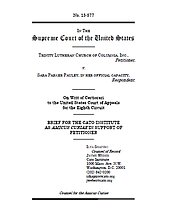Trinity Lutheran Church v. Pauley
Learn more about Cato’s Amicus Briefs Program.
The First Amendment’s religion clauses state, “Congress shall make no law respecting an establishment of religion, or prohibiting the free exercise thereof.” Both of these clauses have been made applicable to the states via the Fourteenth Amendment. The continuing question is how these two clauses interact with one another, particularly in how far a state may go in “separating church and state” before running up against the Free Exercise Clause, or Equal Protection, or the Establishment Clause itself. Take this case: Missouri has a Scrap Tire Grant Program that provides subsidies to construct playground flooring out of recycled old tires. Trinity Lutheran Church runs a daycare center and applied for a grant under the program. The state rated this application highly but nevertheless denied the grant—which would have enabled the purchase of a safe rubber surface for both children in its care and the larger community—solely because Trinity Lutheran is a church. Missouri defends its position by citing the state constitution’s Blaine Amendment, which says that state funds cannot go to support religion. The U.S. Court of Appeals for the Eighth Circuit upheld the state denial and the Supreme Court agreed to hear the case. Cato has now filed a brief supporting the church. Under the Supreme Court’s precedents regarding the “play in the joints” between the Free Exercise and Establishment Clauses, Missouri’s arguments should be insufficient to support its religious discrimination. To begin with, the state’s Blaine Amendment cannot be considered in the absence of its dark history of religious bigotry: Blaine Amendments were created nationwide in the late 19th century not simply to more explicitly separate church and state, but to harm minority religious sects, especially Catholics. Moreover, a state constitutional provision cannot trump the U.S. Constitution, which prohibits discrimination against religion. Even under the Court’s Free Exercise jurisprudence, which since Employment Division v. Smith (1990) has offered less protection to religion against generally applicable laws, Missouri’s denial of the scrap-tire grant would be subject to strict judicial scrutiny because the action was based on Trinity Lutheran’s status as a church—and thus is not the kind of neutral law of general applicability that Smith addressed. The state’s action also violates the Establishment Clause, which the Court has said numerous times prevents not only state promotion of religion but also state hindrance of it: the government must be neutral. And the Court’s holding in Locke v. Davey (2004) is inapposite here, because that case dealt with the unique scenario in which state funds would be going to train a future minister for his religious work. Here, on the other hand, the church has asked for a grant to buy a safer playground surface. There is simply nothing religious about duck-duck-goose! Finally, Missouri’s discrimination violates the Equal Protection Clause, under which the state’s action makes a distinction on the basis of the grant applicant’s religion, which is a suspect classification. Missouri is not required to have a scrap-tire grant program, but once it decided to create one, it must open it to all without regard to religious status.
